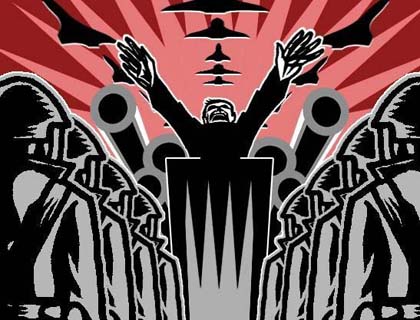We have a democratic framework which is established by years of international community military engagement. But still we lack something; something we do not have, and consistently threaten our already unstable democratic framework on the basis of which, we and our foreign allies want to build a new, safe Afghanistan that wouldn't be the source of threat to regional and global security anymore. And, also, drives away the potential that otherwise can prompt weakening of Taliban-led militants and improvement of security situation.
That is nothing other than lack of democratic behavior among our administrators, civil servants and political officials who are directly or indirectly elected by people through the very democratic system.
Observing the current situation of Afghanistan, I can somehow understand worries of great Greek ancient political philosopher, Aristotle, who claimed democracy as the worst form of the government.
However, his notion of democracy and democratic institutions differs largely with its prevalent concept and pattern of democratic system, but still one of the reasons of his hatred for democracy as a political system holds true in the case of Afghanistan. He was worried that the very democratic procedure would lead to election of those who are illiterate and having no philosophical advantage.
The case now has become similar in Afghanistan except that Afghan people do not want to have philosopher rulers and need those who sympathize with civilians and do not misuse the power for their own narrow interests. In another word, what the people want from current rulers is avoiding ethnic, communal and personal animosity and think about national integrity and national interest.
The worry of Aristotle is realized as people who are really competent and having liberal democratic notion are somehow marginalized in the current political system. However, there are widespread criticisms from Jihadi groups and warlords that the administration of President Karzia is following a policy of discharging of former Jihadi leaders and try to bring the so-called western educated people into mainstream of Afghan politics.
But the notion does not hold true as within the administration still former Jihadi leaders are on key administrative and political posts. And, unlike, those who have liberal and secular thinking and mentality are in minority.
Moreover, after the commencement of the so-called Afghanization of anti-insurgency struggle, President Karzia has largely invested on tribal, religious and other influential leaders, who are mostly consisted of former Jihadi leaders, to push for the success of his alternative project.
In another word, after years of international community military involvement, the outcomes have been quite invisible in the case of security situation and elimination of Taliban and al-Qaeda hideouts. Still Taliban-led militants and its al-Qaeda ally can hold attacks at will even in the most secure areas. Whatever is the reason for the failure but persistence of unrealized military objectives prompted verbal exchange between head of the state and his foreign allies.
Afghan foreign allies have been blaming President Karzia for his dysfunctional administration and huge corruption within the ruling system which has sickened its political potentials that could otherwise had the potential to bring peace and stability.
Foreign and domestic analysts frequently talk about failure of Karzia's administration to acquire civilians' trust in areas where militants still keep hegemony. Even those areas where previously people supported his administration have lost trust and view his government as corrupt one. According this layer of experts, widespread corruption within the administrative and political system is largely blamed for the increasing gap between people and rulers.
This notion pressurized government and President Karzia and he reacted 'tit for tat'. He started blaming foreign countries foreign organization in acceleration of corruption through spending millions of dollars out of Afghan government structure. And of billion dollars poured into the country only small portion has been spent through government channels.
Thus, it is not Afghan government to be blamed but it is foreign countries that prioritized the objective of government. These notions end into political differences and different policy for further maintenance of anti insurgency struggle.
Ultimately what we are observing as new turn in the peace efforts is what President Karzia was demanding years ago and granted by his foreign allies as they have lost hope to achieve previously fixed military and political objectives.
Part of this policy of President Karzia is to involve further people influential leaders to acquire trust of top leaders of militants. This trust can be restored somehow through further engagement of civilian leaders as some of them had close relation with militant previously. Thus, they can bridge better between his government and militants in order to entice them join democratic process.
The very essential part of the step is to tighten relation with Jihadi leaders who still exert hegemony in the Afghan conservative society, because we are in transitional period. In this period, still new and fresh elites have not come forward to challenge completely traditional elites.
No doubt there are some new elites who strongly believe in democratic process, but their number is still small and cannot compete with traditional elites. Therefore, President Karzia rightly understands the fabric of the society and dominance of influential leaders who are generally consisted of former Jihadi leaders.
Thus, he turned back where some criticized of leaving—going back to tribal, religious and Jihadi leaders who indubitably do not have any trust and confidence over democracy and democratic mentality, which in turn weakens the position of democratic behaviors.
Ultimately, through the very political process, people who seize power are those have least believe in democracy. See, for instance, the political and legal controversy between President and MP's during recent past month.
None compromised and agreed on a common ground. All stood steadfast and finally it was the security forces that marched and escorted 9 failed candidates into parliament. These measures vividly show that democratic behavior which is based largely on dialogue and lobby are unfamiliar here. Instead what is familiar is guns and force, which of course hinder institutionalization of democracy.

